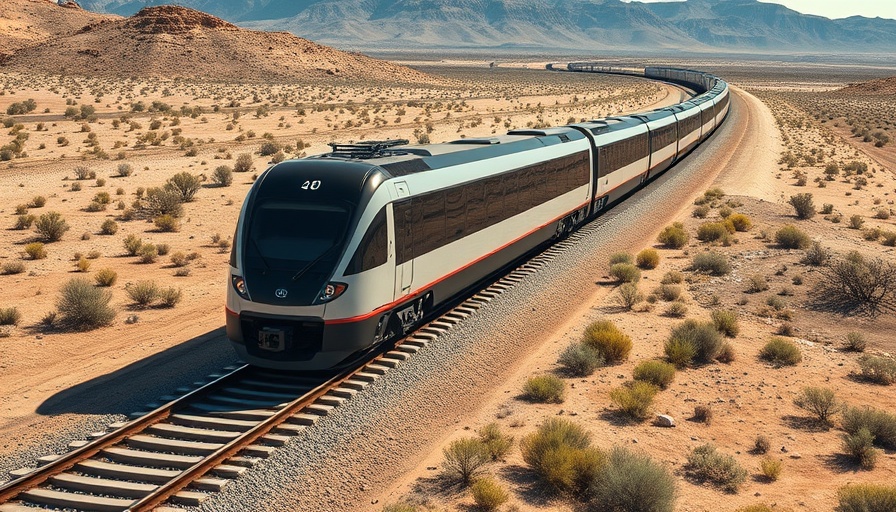
Revolutionizing Freight Transportation with Autonomous Rail Systems
The landscape of freight transportation in the United States is on the brink of a significant transformation, with startups like Parallel Systems stepping to the forefront. The company, led by founder and CEO Matt Soule, aims to disrupt the traditional trucking dominance in goods movement by harnessing the power of autonomous electric rail systems designed specifically for short-distance freight. The United States sees about 20.2 billion tons of freight transported annually, with trucks responsible for approximately two-thirds of this volume. Soule's vision is to make rail a more viable and cost-effective alternative for businesses seeking efficient delivery methods.
Understanding the Challenges and Opportunities in Freight Transportation
The business model of using trucks for short-distance transports has been a well-established norm primarily due to the limitations of traditional rail systems, which rely heavily on large locomotives that pull multiple freight cars over long distances. However, this has also resulted in inefficiencies, particularly for shorter deliveries. Parallel Systems recognizes these challenges and is addressing them with innovative technology designed to adapt to existing infrastructure. By enabling freight cars to attach and detach autonomously, companies can now manage diverse delivery sizes with ease and safety, eliminating the manual risks associated with traditional car connections.
Funding the Future of Freight Innovation
Recently, Parallel Systems has made headlines not just for its ambitious technology but also for its financial backing, having raised $38 million in a Series B funding round led by Anthos Capital. This increase in capital—a part of a total funding surpassing $100 million—aims to propel its commercialization efforts. As attention on sustainability continues to grow, the need for cleaner and more efficient logistics solutions is becoming critical. This investment signifies a recognition from the market that parallel rail systems could be a game changer in freight transportation.
What Autonomy Brings to Rail: Safety and Efficiency
A significant highlight of Parallel’s approach is the enhanced safety features that its autonomous technology provides. Soule points out that their freight cars brake significantly quicker than existing trains. This capability is not only a technical upgrade but a vital advantage in preventing accidents and ensuring safer deliveries. With the Federal Railroad Administration approving pilot testing of their technology in Georgia along a 160-mile stretch from Savannah, real-world application and optimization of this technology will soon be evaluated.
The Competitive Edge: Why Businesses Should Consider Rail
The competitive economics that Parallel Systems is creating aims to challenge the long-standing preference for trucks by providing a more cost-effective option for short hauls. Traditional rail systems have often been seen as cumbersome and expensive, limiting rail’s use among businesses focused on smaller-scale deliveries. However, with the integration of autonomous technology and the adaptability to existing infrastructure, Parallel Systems provides a compelling case for businesses to rethink their logistics strategies.
Learning from the Venture: Business Startup Insights
The case of Parallel Systems highlights essential insights for aspiring entrepreneurs, especially in the startup world. Identifying niche markets where traditional systems fall short can open doors to innovative solutions. For example, those looking into small business startup ideas might learn the importance of understanding customer pain points and how technology can address them effectively. Beyond innovation, securing adequate funding is crucial for launching a startup; Parallel's success sheds light on navigating pivotal funding rounds that will support product development and market entry.
Looking Ahead: Predictions for the Future of Rail Transportation
As we look towards the future, the potential for more collaborations similar to that of Parallel Systems could signify a shift in the industry. Companies that might traditionally focus on consumer goods will begin to consider how logistics impacts their operations. In tandem with government investments to support green initiatives, the spotlight will likely remain on technological advancements in freight transportation, fostering a new era of efficiency, safety, and environmental consciousness.
Conclusion: An Invitation to Innovate in Freight
Entrepreneurs, investors, and business enthusiasts alike should take note of the trends shaping the future of freight transportation. The success stories of innovative startups like Parallel Systems highlight the importance of driving change in traditional industries. Whether you're looking to explore business startup funding options or seeking online business startups opportunities, understanding these dynamics can set the stage for your success. It’s an exciting time for burgeoning entrepreneurs to dive into developments that respond to real-world challenges and contribute to a more sustainable future in the logistic landscape.
 Add Row
Add Row  Add
Add 



Write A Comment